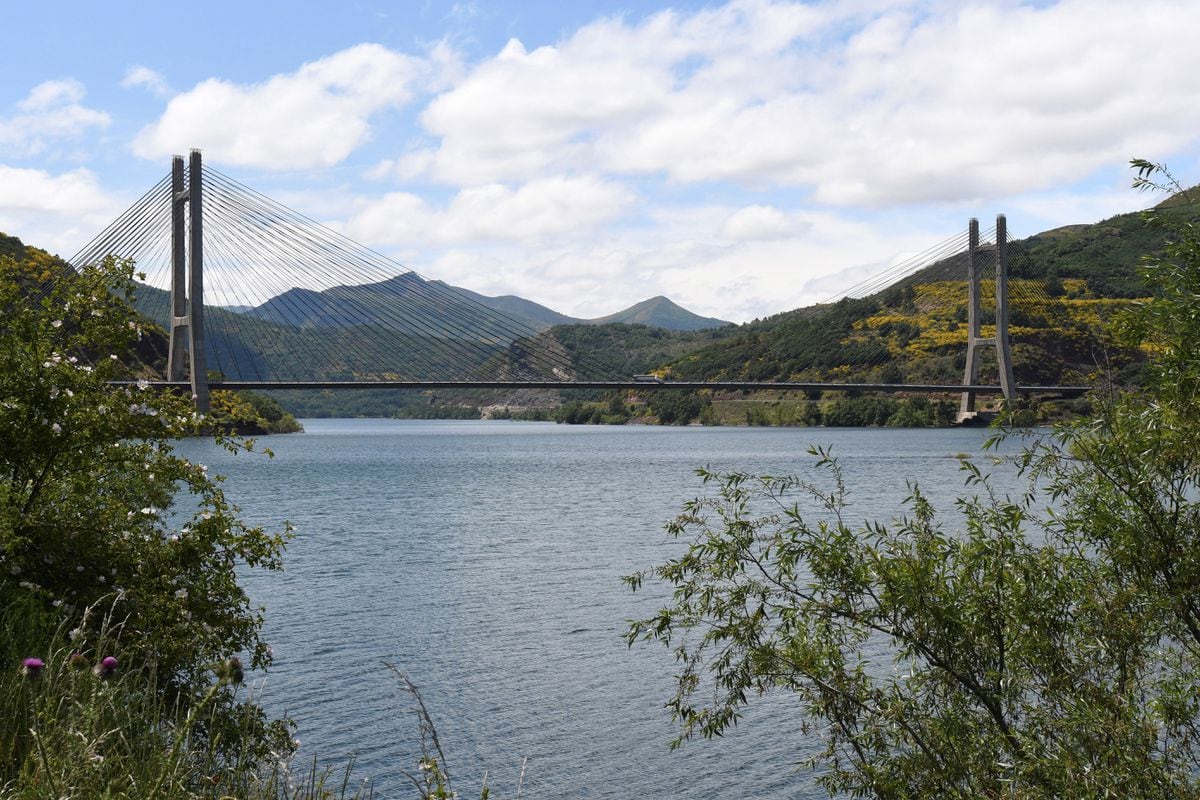A torrent of agrarian protests has taken León after the summer of drought.
The farmers have proclaimed the irrigation revolt and have taken to the streets with their tractors to defend the valued water from the reservoirs.
The statement points to the international treaty known as the Albufeira Convention in 1998, by which Spain and Portugal agreed to manage the five hydrological basins they share.
Among them, the Duero River, which supplies these provincial fields.
The rebellious Leonese fear that, despite the scarcity they suffer, that flow will be diverted to the Portuguese.
And they believe that it will not serve to support the Portuguese farmers or populations with famine, but for the business of hydroelectric plants to generate energy.
Those affected took to the streets of the Leonese capital on Monday with more than 250 tractors and thousands of people to claim what they consider to be an affront to local agriculture.
Several associations of the primary sector and irrigators gathered in León to request explanations from the Duero Hydrographic Confederation (CHD), in charge of the administration of the river.
The mouth in Portugal and the source in Soria del Duero mark that the management of the basin must be protected by the Albufeira agreement.
Javier Alonso, representative of the Páramo Bajo irrigation community, which covers 24,000 hectares of crops, details that the reason for his misgivings lies in the use of water from the reservoirs on his land.
“We think that it is so that the hydroelectric plants produce energy because September is no longer the time to irrigate and because we are not aware that there are localities at risk of restrictions, in which case it would seem very good to us,” says Alonso.
Castilla y León already suffered last year as Iberdrola emptied dams, such as Ricobayo (Zamora), causing serious economic and environmental damage with the aim of unloading to produce more energy from those facilities.
More information
Autumn will be warmer and drier than normal in Spain after the worst summer in 61 years
The Government delegate in the community, Virginia Barcones, has maintained that the Albufeira agreement was signed with José María Aznar (PP) as President of the Government and that "throughout these years it has been in force and the State has complied with it, although this does not mean that the government does not empathize with the farmers”.
Barcones called for dialogue to seek solutions and stressed that "the Spanish State is serious and upholds the agreement" signed with Portugal.
"I understand that feeling of seeing your children's bread in danger, but the institutional responsibility consists of complying with the established agreements, and the restrictions are the same on both sides of the border", the government representative has settled.
Spokespersons for the Ministry of Ecological Transition point out that "Spain is obliged to manage the waters in such a way that throughout this hydrological year that will end on September 30, water contributions from the end of the international stretch of the Duero and also through the Tajo" and detail that these amounts "are not going to put urban supply at risk on this side of the border."
The ministerial information states that "this hydrological year 2021-22 has been very peculiar because, despite the low rainfall recorded in our basins, exceptional conditions have not occurred in a generalized way", a situation that does not affect the Douro or the Tagus.
The slogan, they maintain, happens because in times of drought the agreement commits both parties:
Javier Alonso asks for more information about the international pact to find out under what conditions the union could lose the water resource that, as he presumes, they try to save all year round to cover the needs of farmers: "We have what we have and we are savers like the little ants”.
The dammed volume of the Duero this week remains at a meager 29.9% of the available capacity, somewhat better than the 25.6% of the Leonese swamps, 10 and 9 points less, respectively, than the average for the decade, according to data from the CHD and the Ministry of Ecological Transition, which prove the notable shortage.
The irrigation communities argue that the meteorological context, with much less rain, and land management, with an increase in land for cultivation, should be taken into consideration.
What was signed in Albufeira, they reiterate, should be adapted to these circumstances.
According to his calculations, the unloading of about 4,000 cubic hectometers per water year is needed and about 1,000 would remain to be derived.
The way to do it, they explain, is for the Spanish reservoirs to release these quantities so that, as they flow down towards Portugal and the Atlantic basin, the Portuguese can dispose of it: "We understand that one country cannot leave another dry".
Thus, they maintain that if these liters are lost this fall, if the forecasts continue to punish the Iberian Peninsula without rainfall,
a complicated scenario may arrive for the irrigation of the following campaign.
The warnings of the meteorology experts foresee an autumn and winter drier than usual, so that climate change and its effects join the international successes to increase the concerns of the Leonese primary sector.
Subscribe to continue reading
read without limits
Keep reading
I'm already a subscriber





